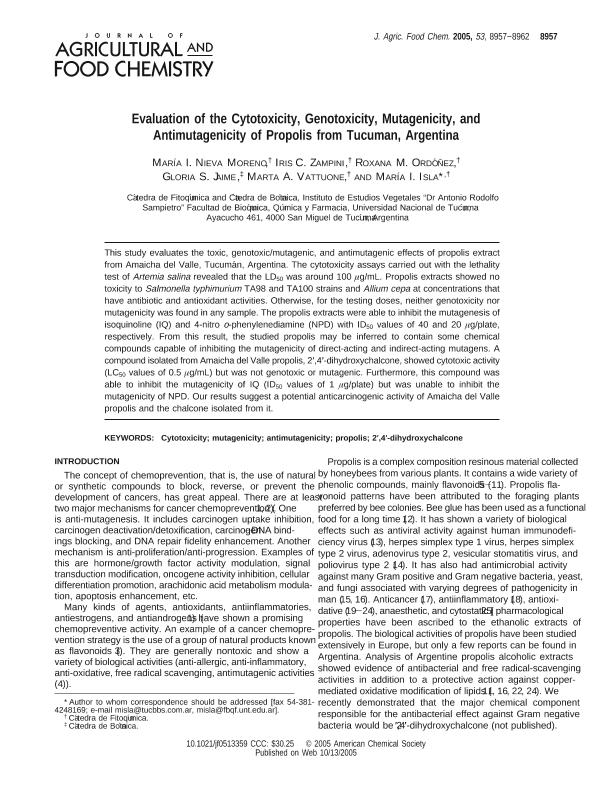Artículo
Evaluation of the cytotoxicity, genotoxicity, mutagenicity, and antimutagenicity of propolis from Tucuman, Argentina
Nieva Moreno, María Inés ; Zampini, Iris Catiana
; Zampini, Iris Catiana ; Ordóñez, Roxana Mabel
; Ordóñez, Roxana Mabel ; Jaime, Gloria Susana; Vattuone, Marta Amelia
; Jaime, Gloria Susana; Vattuone, Marta Amelia ; Isla, Maria Ines
; Isla, Maria Ines
 ; Zampini, Iris Catiana
; Zampini, Iris Catiana ; Ordóñez, Roxana Mabel
; Ordóñez, Roxana Mabel ; Jaime, Gloria Susana; Vattuone, Marta Amelia
; Jaime, Gloria Susana; Vattuone, Marta Amelia ; Isla, Maria Ines
; Isla, Maria Ines
Fecha de publicación:
11/2005
Editorial:
American Chemical Society
Revista:
Journal of Agricultural and Food Chemistry
ISSN:
0021-8561
Idioma:
Inglés
Tipo de recurso:
Artículo publicado
Clasificación temática:
Resumen
This study evaluates the toxic, genotoxic/mutagenic, and antimutagenic effects of propolis extract from Amaicha del Valle, Tucumán, Argentina. The cytotoxicity assays carried out with the lethality test of Artemia salina revealed that the LD50 was around 100 μg/mL. Propolis extracts showed no toxicity to Salmonella typhimurium TA98 and TA100 strains and Allium cepa at concentrations that have antibiotic and antioxidant activities. Otherwise, for the testing doses, neither genotoxicity nor mutagenicity was found in any sample. The propolis extracts were able to inhibit the mutagenesis of isoquinoline (IQ) and 4-nitro o-phenylenediamine (NPD) with ID50 values of 40 and 20 μg/plate, respectively. From this result, the studied propolis may be inferred to contain some chemical compounds capable of inhibiting the mutagenicity of direct-acting and indirect-acting mutagens. A compound isolated from Amaicha del Valle propolis, 2′,4′- dihydroxychalcone, showed cytotoxic activity (LC50 values of 0.5 μg/mL) but was not genotoxic or mutagenic. Furthermore, this compound was able to inhibit the mutagenicity of IQ (ID50 values of 1 μg/plate) but was unable to inhibit the mutagenicity of NPD. Our results suggest a potential anticarcinogenic activity of Amaicha del Valle propolis and the chalcone isolated from it. © 2005 American Chemical Society.
Palabras clave:
2″,4″- Dihydroxychalcone
,
Antimutagenicity
,
Cytotoxicity
,
Mutagenicity
,
Propolis
Archivos asociados
Licencia
Identificadores
Colecciones
Articulos(CERELA)
Articulos de CENTRO DE REFERENCIA PARA LACTOBACILOS (I)
Articulos de CENTRO DE REFERENCIA PARA LACTOBACILOS (I)
Articulos(INQUINOA)
Articulos de INST.DE QUIMICA DEL NOROESTE
Articulos de INST.DE QUIMICA DEL NOROESTE
Citación
Nieva Moreno, María Inés; Zampini, Iris Catiana; Ordóñez, Roxana Mabel; Jaime, Gloria Susana; Vattuone, Marta Amelia; et al.; Evaluation of the cytotoxicity, genotoxicity, mutagenicity, and antimutagenicity of propolis from Tucuman, Argentina; American Chemical Society; Journal of Agricultural and Food Chemistry; 53; 23; 11-2005; 8957-8962
Compartir
Altmétricas



